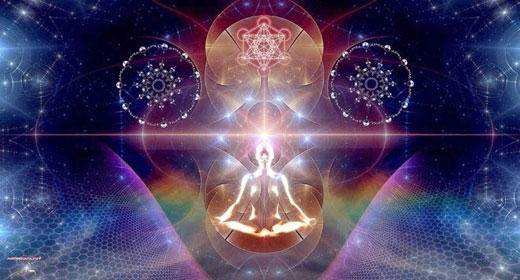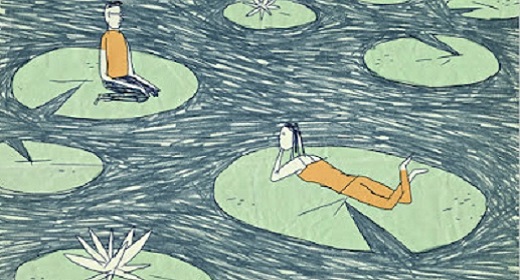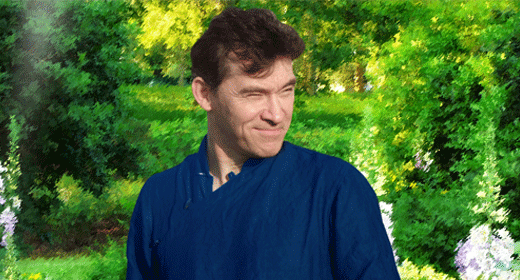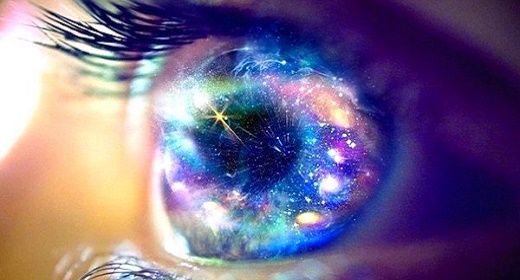Awaken: Thank you, Sri Ramana Maharshi, for honoring us with your time today. If I may, I will start by diving right into the heart of things… What does it mean to awaken?

Sri Ramana Maharshi: One must realize his Self… Realization is not acquisition of anything new nor is it a new faculty. It is only removal of all camouflage.
Your duty is to be… and not to be this or that. I am that I am sums up the whole truth.
Awaken: Could you elaborate? And what is the best method by which to realize the Self?
Sri Ramana Maharshi: All we need to do is to give up our habit of regarding as real, that which is unreal. All religious practices are meant solely to help us do this. When we stop regarding the unreal as real, then reality alone will remain, and we will be that.
The method is summed up in the words Be still. What does stillness mean? It means destroy yourself. Because any form or shape is the cause for trouble. Give up the notion that I am so and so. All that is required to realize the Self is to be still. What can be easier than that?
Awaken: What is the best way to start?
Sri Ramana Maharshi: Become conscious of being conscious. Say or think “I am”, and add nothing to it. Be aware of the stillness that follows the “I am”. Sense your presence, the naked, unveiled, unclothed beingness. It is untouched by young or old, rich or poor, good or bad, or any other attributes. It is the spacious womb of all creation, all form.
Awaken: But for many, it is not so easy to be still! It seems the mind is so busy all the time! Thoughts never cease! What is the best way to help the mind to become quiet?
Sri Ramana Maharshi: By the inquiry ‘Who am I?’. The thought ‘Who am I?’ will destroy all other thoughts, and like the stick used for stirring the burning pyre, it will itself, in the end, get destroyed. Then, there will arise Self-realization.
Awaken: Are there any other means for helping the mind to become still? It seems that so many practices emphasize working with the breath…
Sri Ramana Maharshi: Other than inquiry, there are no adequate means. If through other means, it is sought to control the mind, the mind will appear to be controlled, but will again go forth. Through the control of breath also, the mind will become quiescent; but it will be quiescent only so long as the breath remains controlled, and when the breath resumes, the mind also will again start moving and will wander as impelled by residual impressions. The source is the same for both mind and breath. Therefore, the exercise of breath control is only an aid for rendering the mind quiescent. Like the practice of breath control, meditation on the forms of God, repetition of mantras, restriction on food, etc., are but aids for rendering the mind quiescent.
Awaken: To make sure I understand… By inquiring into the true nature of the self, with the simple question Who am I, I will finally experience the quiescence… or rather, the stillness, that arises naturally, but also, I will have revealed the true nature of the self… Is there no way to describe what this true Self is?
Sri Ramana Maharshi: The gross body, which is composed of the seven humors (dhatus), I am not; the five cognitive sense organs, viz., the senses of hearing, touch, sight, taste and smell, which apprehend their respective objects, viz. sound, touch, color, taste and odor, I am not; the five cognitive sense organs, viz., the organs of speech, locomotion, grasping, excretion and procreation, which have as their respective functions, speaking, moving, grasping, excreting and enjoying, I am not; the five vital airs, prana, etc., which perform respectively the five functions of in-breathing, etc., I am not; even the mind which thinks, I am not; the nescience too, which is endowed only with the residual impressions of objects and in which there are no objects and no functionings, I am not.
Awaken: If I am none of these, then who am I?
Sri Ramana Maharshi: After negating all of the above mentioned as ‘not this’, ‘not this’, that Awareness which alone remains – that I am.
Awaken: Are there no words to describe this I AM?
Sri Ramana Maharshi: The Self is that where there is absolutely no ‘I’-thought. That is called ‘Silence’. The Self itself is the world; the Self itself is ‘I’; the Self itself is God; all is Siva, the Self. What exists in truth is the Self alone. The world, the individual soul and God are appearances in it, like silver in mother-of pearl; these three appear at the same time and disappear at the same time.
Awaken: If the Self is I, and the Self is the world, and the Self is God, then all is one…
Sri Ramana Maharshi: The Self is the one reality that always exists, and it is by the light of the Self that all other things are seen. We forget it and concentrate on the appearance. The light in the hall burns both when persons are present and when they are absent, both when persons are enacting something, as in a theatre, and when nothing is being enacted.
It is the light which enables us to see the hall, the persons and the acting. We are so engrossed with the objects or appearances revealed by the light, that we pay no attention to the light. In the waking or dream state in which things appear, and in the sleep state in which we see nothing, there is always the light of consciousness or Self, like the hall lamp which is always burning. The thing to do is to concentrate on the seer and not on the seen, not on the objects, but on the light which reveals them.
Questions about the reality of the world, and about the existence of pain or evil in the world, will all cease when you inquire Who am I? and find out the seer. Without a seer the world… the evils thereof alleged, do not exist.
Awaken: Does that mean that without a seer, the world itself, is likewise, not real?
Sri Ramana Maharshi: The world should be considered like a dream.
Awaken: How can I become a better student, so as to advance in my inquiry, and truly see everything as God?
Sri Ramana Maharshi: He who gives himself up to the Self, which is God, is the most excellent devotee. Giving one’s self up to God means remaining constantly in the Self without giving room for the rise of any thoughts other than that of the Self.
Awaken: You have also spoken of the beauty that comes from surrendering to God. In this way, there is first the inquiry and then a renunciation of our sense of doing?
Sri Ramana Maharshi: Whatever burdens are thrown on God, He bears them. Since the supreme power of God makes all things move, why should we, without submitting ourselves to it, constantly worry ourselves with thoughts as to what should be done and how, and what should not be done and how not? We know that the train carries all loads, so after getting on it, why should we carry our small luggage on our head to our discomfort, instead of putting it down in the train and feeling at ease?
Awaken: This echoes Buddha’s teaching on non-attachment. He speaks of the deep peace and relief that comes from letting go of our thoughts and personal agendas…
Sri Ramana Maharshi: As thoughts arise, destroying them utterly without any residue in the very place of their origin is non-attachment. Just as the pearl-diver ties a stone to his waist, sinks to the bottom of the sea and there takes the pearls, so each one of us should be endowed with non-attachment… dive within oneself and obtain the Self-Pearl.
Awaken: Everyone does what they do because they believe it will make them happy, and yet, everyone is still searching for happiness! Does the way of non-attachment result in true happiness?
Sri Ramana Maharshi: To attain that natural happiness, one must know oneself. For that, Self-inquiry, Who am I? is the chief means. Happiness is the nature of the Self. They are not different. The only happiness there is, is of the Self. That is the truth. There is no happiness in worldly objects. Because of our ignorance we imagine we derive happiness from them.
Under the tree the shade is pleasant; out in the open the heat is scorching. A person who has been going about in the sun feels cool when he reaches the shade. Someone who keeps on going from the shade into the sun and then back into the shade is a fool. A wise man stays permanently in the shade. Similarly, the mind of the one who knows the truth does not leave Brahman. The mind of the ignorant, on the contrary, revolves in the world, feeling miserable, and for a little time, returns to Brahman to experience happiness.
In fact, what is called “the world” is only thought. When the world disappears, i.e., when there is no thought, the mind experiences happiness; and when the world appears, it goes through misery.
Awaken: It seems that thoughts and thinking are really our sole problem!
Sri Ramana Maharshi: When there are thoughts, it is distraction: when there are no thoughts, it is meditation. All thoughts have their root in the I-thought. Whoever investigates the True “I” enjoys the stillness of bliss. Of all the thoughts that rise in the mind, the thought ‘I’ is the first thought. The “I” thought is said to be the sum total of all thoughts. The source of the “I” thought has to be inquired into.
Awaken: So, the thoughts that constantly bombard us are like imposters, in the sense that they are associated with the “I” or false self, rather than the true Self? Can we get into the nitty-gritty of it and explore further into your method of meditation, so that I can better understand how to open the doors to the realization of the true Self?
Sri Ramana Maharshi: The mind will merge only by Self-inquiry… Who am I? The thought Who am l? will destroy all other thoughts and finally kill itself, also. If other thoughts arise, without trying to complete them, one must inquire to whom did this thought arise.
That single thought keeps away other thoughts; distraction of mind is a sign of its weakness; by constant meditation, it gains strength. Meditation is sticking to one thought. Good thoughts keep off bad thoughts. They must themselves disappear before the state of realization. Thoughts come and go. Feelings come and go. Find out what it is that remains.
Awaken: But, thoughts always seem to keep coming! By the thousands!
Sri Ramana Maharshi: What does it matter how many thoughts arise? As each thought arises, one must be watchful and ask, to whom is this thought occurring? The answer will be to me. If you inquire Who am I? the mind will return to its source. The thought which arose will also submerge. As you practice like this more and more, the power of the mind to remain at its source is increased. The ‘I-thought’ will also sink, along with the breath. Simultaneously another luminous and infinite ‘I-I’ will emerge, and it will be continuous and unbroken. That is the goal.
Awaken: And when this goal is realized… it is called liberation, or Moksha?
Sri Ramana Maharshi: It goes by different names — God, Self, Kundalini, Shakti, Consciousness, etc.
Awaken: And so, through liberation, the true reality will be experienced?
Sri Ramana Maharshi: Consciousness is the only reality. Consciousness plus waking we call waking. Consciousness plus sleep we call sleep. Consciousness plus dream we call dream. Consciousness is the screen on which all the pictures come and go. The screen is real, the pictures are mere shadows on it. The Self and the appearances therein, as the snake in the rope, can be well illustrated like this. There is a screen. On that screen first appears the figure of a king. He sits on a throne. Then before him on that same screen a play begins with various figures and objects, and the king on the screen watches the play on the same screen. The seer and the seen are mere shadows on the screen, which is the only reality, supporting all the pictures.
Awaken: It reminds me of Plato’s Cave… Or Chuang Tzu’s Butterfly… how the mind tricks us! Is everything just a dream? And if so, the bigger question is: how could any suffering be real, and why should we bother to care about any wrong doing in the world, at all?
Sri Ramana Maharshi: From the point of view of Jnana (Knowledge) or the Reality, the pain seen in the world is certainly a dream, as is the world, of which any particular pain, like hunger, is an infinitesimal part. In the dream also, you yourself, feel hunger. You see others suffering from hunger. You feed yourself, and moved by pity, feed the others, whom you find suffering from hunger
So long as the dream lasted, all those pains were as real as you now think the pain in the world to be. It was only when you woke up that you discovered that the pain in the dream was unreal. You might have eaten to the full and gone to sleep. You dream that you work hard and long in the hot sun all day, are tired and hungry and want to eat a lot. Then you wake up and find your stomach is full and you have not stirred out of your bed.
But this does not mean that while you are in the dream you can act as if the pain you feel is not real. The hunger in the dream has to be assuaged by the food in the dream. The fellow beings you found so hungry in the dream had to be provided with food in that dream. You can never mix up the two states, the dream and the waking state. ‘Till you reach the state of jnana (knowledge) and thus, wake out of maya (illusion), you must do social service by relieving suffering whenever you see it. But even then, you must do it without ahankara, i.e., without the sense of I am the doer, but with the feeling, I am the Lord’s tool.
Similarly, one must not be conceited by thinking, I am helping a man below me. He needs help. I am in a position to help. I am superior and he inferior. But you must help the man as a means of worshipping God in that man. All such service is for the Self and not for anybody else. You are not helping anybody else, but only yourself.
Awaken: Which is to say, God? Because the Self is God. And so, by serving others, we are serving God… In this way, it seems that the best way to worship the divine is through service…
Sri Ramana Maharshi: The true secret of worshipping God, the soul of the soul, is to act in whatever way the divine grace of God dictates.
Awaken: We have spoken about the process of inquiry through the mind, Jnana Yoga, but I would like to explore this a little deeper by going back to the question of the breath, or pranayama, and its role in controlling the mind…
Sri Ramana Maharshi: Pranayama need not be exactly as prescribed in hatha yoga. If engaged in dhyana(meditation), bhakti, etc., just a little control of breath will suffice to control the mind. The mind is the rider and breath the horse. Pranayama is a check on the horse. By that check the rider is checked. Pranayama may be done just a little. To watch the breath is one way of doing it. The mind is drawn away from other activities by being engaged in watching the breath. That controls the breath, and the mind in its turn, is also controlled. If rechaka (exhalation) and puraka (inhalation) are found difficult to practice, retention of breath alone for a short while may be practiced… That too will yield good results.
There is no other way of controlling the mind except as prescribed in the books, like the Gita, drawing in the mind as often as it strays or goes outward, and fixing it in the Self. Of course, it will not be easy to do it. It will come only with practice or sadhana.
Awaken: And ultimately, by “taming the horse,” as you say, we can finally settle the mind so as to reach God consciousness?
Sri Ramana Maharshi: God illumines the mind and shines within it. One cannot know God by means of the mind. One can but turn the mind inwards and merge it in God.
When we quest within our mind ‘Who am I?’ and reach the Heart, ‘I’ topples down and immediately another entity will reveal itself proclaiming ‘I-I’. Even though it also emerges saying ‘I’, it does not connote the ego, but the One Perfect Existence.
Awaken: You have mentioned the ego, the imposter self that impedes our progress. Is there a means of abolishing it? Is that even the point? Will it subside of its own accord through diligent practice?
Sri Ramana Maharshi: What is the best way of killing the ego? To each person that way is best which appears easiest or appeals the most. All the ways are equally good, as they lead to the same goal, which is the merging of the ego in the Self. What the bhakta (devotee) calls surrender, the man who does vichara (self-inquiry) calls jnana. Both are trying to take the ego back to the source from which it sprang and make it merge there.
To ask the mind to kill itself is like making the thief the policeman. He will go with you and pretend to catch the thief, but nothing will be gained. So you must turn inward, and see from whence the mind rises and then it will cease to exist.
Breath and mind arise from the same source and when one of them is controlled the other is also controlled. As a matter of fact, in the quest method — which is more correctly “Whence am I?” and not merely “Who am I?” — we are not simply trying to eliminate, saying “We are not the body, nor the senses and so on”, to reach what remains as the ultimate reality, but we are trying to find out whence the ‘I-thought’ or the ego arises within us. The method contains within it, though implicitly and not expressly, the watching of the breath. When we watch wherefrom the ‘I-thought’ arises, we are necessarily watching the source of breath also, as the ‘I-thought’ and the breath arise from the same source.
Awaken: And what role does diet play in a lifestyle that supports our practice?
Sri Ramana Maharshi: By means of a moderate quantity of sattvic (pure) food, which is superior to all other rules and regulations of self discipline, the sattvic or pure quality of the mind will grow and Self-inquiry will be helped.
Awaken: To continue with questions of lifestyle… in some traditions, much emphasis is placed on early morning rising, cold showers, and the chanting of certain mantras, and such… so you feel these kinds of things are imperative?
Sri Ramana Maharshi: Regulation of life, such as getting up at a fixed hour, bathing, doing mantra-japa (chanting of mantra) etc., all this is for people who do not feel drawn to Self-inquiry, or are not capable of it. But for those who can practice this method, all rules and disciplines are unnecessary…
Undoubtedly it is said in some books, that one should go on cultivating one good quality after another and thus prepare for moksha (liberation); but for those who follow the jnana, their sadhana (spiritual practice) is itself quite enough for acquiring all daivic (divine) qualities; they need not do anything else.
Awaken: Finally, what about other Yogic paths, such as the the devotional, or Bhakti Path?
Sri Ramana Maharshi: Bhakti is not different from mukti (liberation). Bhakti is being as the Self. One is always That. He realizes It by the means he adopts. What is bhakti? To think of God. That means only one thought prevails to the exclusion of all other thoughts. That thought is of God, which is the Self, or it is the self surrendered unto God. When He has taken you up, nothing else will assail you. The absence of thought is bhakti. It is also mukti.
Awaken: I think that the idea of surrendering to God is uncomfortable to many, due to a kind of fear of relinquishing our free will—if it exists, at all—to that of God’s will. I would love to know your thoughts on this… but also, the related “problem of evil”… in other words, if everything is God’s will, and God is good, why do horrible things happen, at all?
Sri Ramana Maharshi: It is asked, why all this creation is so full of sorrow and evil. All one can say is that it is God’s will, which is inscrutable. No motive, no desire, no end to achieve can be attributed to that infinite, all-wise and all-powerful Being. God is untouched by activities which take place in His presence. There is no meaning in attributing responsibility and motive to the One, before it became many. But God’s will for the prescribed course of events is a good solution for the vexed question of free-will. If the mind is worried over what befalls us, or what has been committed or omitted by us, it is wise to give up the sense of responsibility and free-will, by regarding ourselves as the ordained instruments of the All-Wise and the All-Powerful, to do and suffer as He pleases. Then He bears all the burdens and gives us peace.
Awaken: Is that what is meant by “happiness?” Is it simply the state of being at peace?
Sri Ramana Maharshi: When there is freedom from undesirable contacts or memory thereof, we say there is “happiness.” Such happiness is relative and is better called “pleasure.” But men want absolute and permanent happiness. This does not reside in objects, but in the Absolute. It is “Peace.” It is being free from pain and pleasure altogether—it is a neutral state.
Awaken: Could you elaborate further on the difference between pleasure and happiness?
Sri Ramana Maharshi: It is pleasure that helps our growth; food, exercise, rest, and gregarious qualities. Ego’s perfection is suddenly broken at a point, and a want is felt, giving rise to a desire to get something or do something. When that want is cured by the fulfillment of that desire, the ego is happy and the original perfection is restored. Happiness may be said to be our natural condition or nature. Pleasure and pain are relative and refer to our finite state, with progress by satisfaction of want.
If relative progress is stopped and the soul merges into Brahman – of the nature of perfect peace – that soul ceases to have relative, temporary pleasure and enjoys perfect peace – Bliss. Hence Self-Realization is Bliss; it is realizing the Self as the limitless spiritual eye (jnana dristi) and not clairvoyance; it is the highest self… surrender. Samsara (the world-cycle) is sorrow.
Awaken: So, just to assure my understanding… “pleasure” belongs to the finite self, and “happiness” belongs to the soul, and is realized by way of merging with Brahman… our true and original nature?
Sri Ramana Maharshi: It is nothing more than being in the pristine state. This is all that need be said.
Awaken: It seems so simple, and yet there are so many religions, which are so often fraught with disputes and even violence. How does something so simple become so complex?
Sri Ramana Maharshi: Indeed. Because people want something elaborate and attractive and puzzling, so many religions have come into existence and each of them is so complex and each creed in each religion has its own adherents and antagonists.
For example, an ordinary Christian will not be satisfied unless he is told that God is somewhere in the far-off Heavens not to be reached by us unaided. Christ alone knew Him and Christ alone can guide us. Worship Christ and be saved. If told the simple truth – “The Kingdom of Heaven is within you” – he is not satisfied and will read complex and far-fetched meanings in such statements. Mature minds alone can grasp the simple Truth in all its nakedness.
Awaken: The world is in such turmoil right now… How do we balance our personal quest for Self-Realization with the call to help humanity? What can we do to help the world?
Sri Ramana Maharshi: Realization of the Self is the greatest help that can be rendered to humanity. A realized one sends out waves of spiritual influence in his aura, which draw many people towards him. Yet he may sit in a cave and maintain complete silence. When one’s self arises all arises; when one’s self becomes quiescent all becomes quiescent. To the extent we behave with humility, to that extent there will result good. And if the mind is rendered quiescent, one may live anywhere.
Awaken: Dear teacher, I would like to thank you once again for your time today. We are blessed and honored to share your teachings with our readers and fellow seekers.
This is one of Awaken’s Dream Interviews, conducted by Donna Quesada, and All Answers are Verbatim from Sri Ramana Maharshi.









































